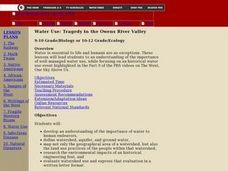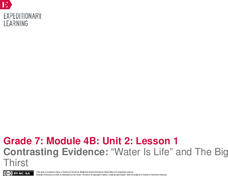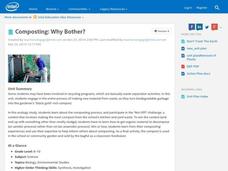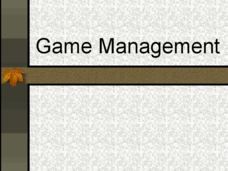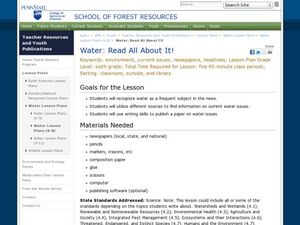Curated OER
Water Use: Tragedy in the Owens River Valley
Students examine water management issues. In this environmental issues lesson, students watch a PBS video to develop an understanding of watershed, aquifers, and ground water. Students evaluate watershed issues in the Owens River Valley...
Curated OER
Water Conservation
Learners identify ways to conserve water. In this environmental lesson, students use a water use checklist to identify how much water they use in one day. Learners analyze the data and brainstorm ways to conserve water.
EngageNY
Gathering Information about Water Management: Assessing and Reading Internet Sources, Day 3
Water is life! Using the informative resource, scholars first read two informational articles about water management in agriculture. Then, they use a Venn diagram to contrast the different types of evidence authors use to support a...
Salt River Project
How Do We Clean Polluted Water?
How do we clean up oil spills and other pollutants in the water? Explore water treatment strategies with a set of environmental science experiments. Groups remove oil from water, work with wastewater treatment, and perform a water...
Curated OER
Be Water Wise!
Rally your administration and facilities manager to let your class examine the water flow rates in different areas of the school. After the audit, the class researches opportunites for conserving water and writes a report or develops a...
Florida Department of Environmental Protection
Water, Water Everywhere
Water is one of the most precious resources on the earth. Explore water conservation, the importance of natural resources, and how water is used throughout the globe. Two complete activities along with discussion questions are used to...
EngageNY
Gathering Information about Water Management: Assessing and Reading Internet Sources, Day 2
Accuracy, credibility, timeliness ... it's time to act on source reliability! Pupils continue conducting Internet research, selecting two questions about water management from their researcher's notebooks that they want to explore...
iCivics
Washington’s Water
It's easy to forget about something as simple as water, a substance that is easily available to many in the world. However, understanding water management and the importance of a renewable resource system becomes clear in an informative,...
EngageNY
Gathering Information about Water Management: Assessing and Reading Internet Sources, Day 1
It takes time to discover what makes a source accurate and credible. Using everything they've learned about source credibility, scholars begin researching supporting questions about how industry and agriculture manage water. They select...
EngageNY
End of Unit 2 Assessment, Part 1A: Fishbowl on Better Use of Water in Agriculture
Just keep swimming! Pupils participate in a Fishbowl discussion, sitting in two concentric circles and alternating between speaking and listening roles. During the discussion, they defend a claim about the best way to begin managing...
Center for Learning in Action
Water—Changing States (Part 1)
Here is part one of a two-part lesson in which scholars investigate the changing states of water—liquid, solid, and gas. With grand conversation and up to three demonstrations, learners make predictions about what they think will happen...
Curated OER
How Much Water?
Young scholars investigate amount of water available in different countries around the world, compare it to their daily water use, and explore how unequal distribution of water can cause challenges to survival. Students then discuss...
San Francisco Public Utilities Commission
Our Water: Many Users - Many Uses
California's water supply is not always stable. Learn about the ways that California weathers a drought with a reading activity about water usage and agriculture. Once kids finish the reading passage, they answer a series of...
Pennsylvania State University
Learn, Protect, and Promote Water
A hands-on activity helps learners explore the water cycle. After discussing how they use water, classes discuss water pollution and then move into a simulation where 20 pupils move through the water cycle based on description cards.
NASA
Water Rocket Launcher
How can you launch an object that isn't propelled by air? The resource provides directions to build a launcher to launch rockets made of two-liter bottles. The launcher, built mainly from materials found at the local hardware store, uses...
EngageNY
Analyzing Interaction: Categories of Water Management in The Big Thirst
It's puzzle time! Pupils participate in a jigsaw activity to discuss the various uses of water, including personal, agricultural, and industrial uses. They also conduct a close reading of The Big Thirst by Charles Fishman and answer...
EngageNY
Contrasting Evidence: “Water Is Life” and The Big Thirst
Sometimes differing arguments support the same claim. Scholars complete a graphic organizer comparing how two authors support the claim that people need to better manage the world's water supply. Pupils also complete a graphic organizer...
Curated OER
Watering Our Prairie Farms
After reading an article about irrigation on Canadian farms, learners participate in a discussion. They individually write an opinion paper about the surrounding issues. A lesson like this can be used in an earth science class when...
Curated OER
Boat Safety and Water Sports - Lesson 1 - Boating Basics
Teach your young adventurers about boating basics, such as boating terminology, knots, key aspects of the boat, and how to determine a boat's capacity. This resource is a good way to get started on learning how to water ski. There are...
Intel
Composting: Why Bother?
The first STEM lesson in a group of 10 explores composting. After discussing how to make a better tomorrow, classes are challenged to track garbage in their communities, visit a local waste management facility, and conduct a survey about...
Curated OER
Game Management
Many factors that lead to conserving wildlife are covered on these slides. The meanings and definitions are clear, and the specific topics covered are relevant and complete. This slideshow would be very useful to include in a science,...
University of Florida
Protecting Our Water Resources
Teach young environmentalists to protect their planet's resources with a set of interactive experiments. Kindergartners and other youngsters learn about watersheds and the water cycle, while older elementary learners focus on fertilizer...
Curated OER
Water Web-- Ponds
In this social studies and science activity, students learn the importance of ponds in an area's watershed by reading and completing the 8 pages of questions and activities in this newsletter, which is put out by the Southwest Florida...
Curated OER
Water: Read All About It!
Students discuss newspapers and water and work in groups to develop their own paper focusing on water issues. In this journalism lesson, students discuss the value of newspapers and water as an issue. They work as a group to develop a...


